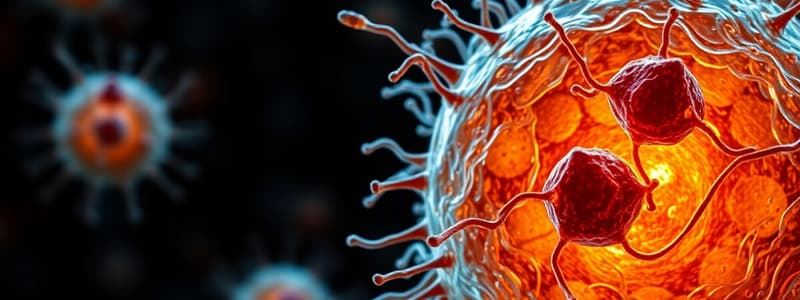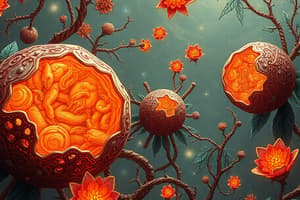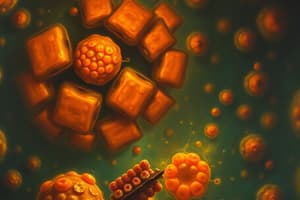Podcast
Questions and Answers
What is the primary function of the autophagy process in cells?
What is the primary function of the autophagy process in cells?
- Synthesis of new proteins
- Regulation of gene expression
- Degradation and recycling of cytoplasmic components (correct)
- Production of reactive oxygen species (ROS)
Which type of autophagy specifically targets damaged mitochondria?
Which type of autophagy specifically targets damaged mitochondria?
- Selective autophagy (correct)
- Macroautophagy
- Chaperone-mediated autophagy
- Non-selective autophagy
What consequence does the loss of proteostasis due to aging lead to?
What consequence does the loss of proteostasis due to aging lead to?
- Protein aggregation and cellular dysfunction (correct)
- Enhanced metabolism
- Increased protein synthesis
- Improved insulin sensitivity
What is the relationship between ROS generation and autophagy in aging?
What is the relationship between ROS generation and autophagy in aging?
What did the overexpression of ATG5 in mice indicate about its role in aging?
What did the overexpression of ATG5 in mice indicate about its role in aging?
Which scientist was awarded the Nobel Prize for discoveries related to autophagy mechanisms?
Which scientist was awarded the Nobel Prize for discoveries related to autophagy mechanisms?
What is one of the roles of intermittent fasting related to cellular processes?
What is one of the roles of intermittent fasting related to cellular processes?
What phenomenon does telomere attrition primarily affect?
What phenomenon does telomere attrition primarily affect?
What role does mTOR play in autophagy regulation?
What role does mTOR play in autophagy regulation?
Which of the following is a consequence of declining autophagic capacity in aging?
Which of the following is a consequence of declining autophagic capacity in aging?
How does autophagy affect genomic stability?
How does autophagy affect genomic stability?
In somatic cells, what is the process called where telomeres become shorter with each cell cycle?
In somatic cells, what is the process called where telomeres become shorter with each cell cycle?
What triggers cell death through autophagy activation during cellular crisis?
What triggers cell death through autophagy activation during cellular crisis?
What happens to the activity of telomerase in most somatic cells as they age?
What happens to the activity of telomerase in most somatic cells as they age?
Which process has been implicated in the degradation of oxidized proteins?
Which process has been implicated in the degradation of oxidized proteins?
What is the primary consequence of insufficient energy for DNA replication and repair in autophagy-defective cells?
What is the primary consequence of insufficient energy for DNA replication and repair in autophagy-defective cells?
Study Notes
Autophagy
- A cellular process that breaks down and recycles cellular components.
- It involves the formation of a double-membrane vesicle called an autophagosome that engulfs cellular material.
- This vesicle then fuses with a lysosome, where the cellular material is degraded.
- First described by Christian de Duve in 1963.
- The Nobel Prize was awarded to Yoshinori Ohsumi in 2016 for his discoveries regarding autophagy.
Types of Autophagy
- Selective autophagy: targets specific cellular components, such as damaged mitochondria or protein aggregates.
- Non-selective autophagy: targets a broader range of cellular material, including cytoplasmic organelles and proteins.
Cellular Autophagy and Aging
- Overexpression of ATG5 in mice increases longevity and has anti-aging effects.
- ATG5 overexpression also improves metabolism, reduces age-related obesity, and enhances insulin sensitivity.
ROS Generation and Autophagy
- Mitochondrial ROS can activate ATG4, leading to mitophagy (selective autophagy of mitochondria).
- Mitophagy reduces ROS levels by removing damaged mitochondria.
Loss of Proteostasis
- Aging leads to an imbalance in proteostasis, resulting in protein aggregation and accumulation of misfolded proteins.
- This contributes to cellular dysfunction.
- Both autophagosomes and lysosomes decline in an age-dependent manner.
- Chaperone-mediated autophagy (CMA) directly degrades oxidized and potentially harmful proteins.
Mitochondrial Dysfunction in Aging
- Decreased mitochondrial function leads to a decline in autophagic capacity, which further contributes to the accumulation of damaged molecules and inflammation.
Nutrient Sensing Deregulation and Intermittent Fasting
- mTOR is a negative regulator of autophagy that is sensitive to dietary amino acids.
- Activation of mTOR inhibits autophagy.
- AMPK is a positive regulator of autophagy that responds to low cellular energy levels (high AMP/ATP ratio).
- Activation of AMPK promotes autophagy.
Genomic Instability and Autophagy
- Defective autophagy can contribute to genomic instability through:
- Failure to control damage to checkpoint or repair proteins.
- Deregulation of centrosome turnover.
- Insufficient energy for proper DNA replication and repair.
- Increased production of reactive oxygen species due to inefficient removal of damaged mitochondria.
Telomere Attrition
- Telomeres are repetitive DNA sequences at the ends of chromosomes.
- Telomerase is an enzyme that replicates telomeres.
- Somatic cells lack telomerase expression.
- Telomeres shorten with each cell division (telomere attrition).
- Aging leads to a decline in telomerase activity in most somatic cells.
- Impaired telomere maintenance contributes to cellular senescence.
- Cellular crisis can trigger autophagy activation, leading to cell death.
Autophagic Treatments in Aging and Age-Related Diseases
- Inducing or restoring autophagy could potentially alleviate aging symptoms and age-related diseases.
- Research is ongoing to develop therapies that target autophagy pathways for therapeutic purposes.
Studying That Suits You
Use AI to generate personalized quizzes and flashcards to suit your learning preferences.
Related Documents
Description
This quiz explores the cellular process of autophagy, including its mechanisms, types, and impact on aging. Learn about the role of autophagosomes, the significance of selective and non-selective autophagy, and the connection between autophagy and longevity. Test your knowledge on how this critical process affects cellular health.




